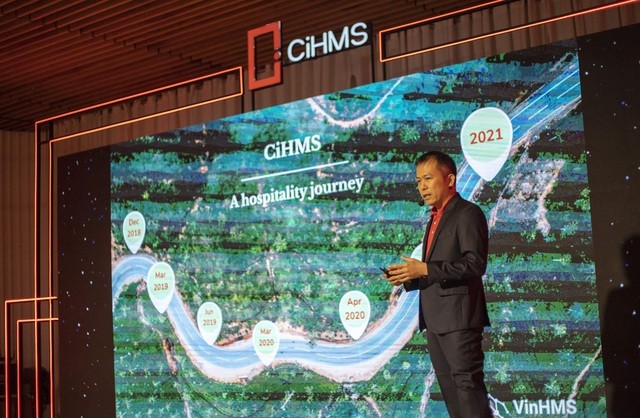 Phong Nha-Ke Bang National Park in Quang Binh province has become more internationally known through tourism marketing channels. (Photo: dangcongsan.vn) Phong Nha-Ke Bang National Park in Quang Binh province has become more internationally known through tourism marketing channels. (Photo: dangcongsan.vn)
|
With Gotadi, a flight and hotel booking app, HG Holdings, a Vietnam market leader in hospitality, is considered a successful example of applying digital transformation (DX).
Or Hahalolo, an integrated tourism website based on a social network to introduce its services to tour providers and tourism enterprises, has been run for one year and gathered more than 6 million users. Hahalolo is trying to change the habits of Vietnamese travellers by only booking tours and tickets online.
Another successful case in digital transformation is ViVu Travel, whose director Dang Ngoc Tai said DX and boosting travel demands are vital for tourism companies against the current pandemic.
These are some of many businesses in the hospitality sector to prove the urgency of applying IT and digital transformation to revive the industry, especially against the COVID-19 pandemic.
 Nguyen Van Hoang, VinHMS CEO at the launch ceremony of the company's CiHMS, a complete hospitality management solution. Nguyen Van Hoang, VinHMS CEO at the launch ceremony of the company's CiHMS, a complete hospitality management solution.
|
According to Nguyen Van Hoang, CEO of VinHMS, a VinGroup company specializing in software production and business, Vietnam’s hospitality businesses are still in the early stage of the digital transformation process, adding:
“I’ve seen hotels spend more attention on mobile apps. Some of them allow sound check-in but I believe we can do a lot more because the technology is changing and allows you to do a lot more to improve customer experience,” said Hoang.
Before the coronavirus pandemic, the process was slow and fragmented because there was no urgency for hotels to focus much on technology to improve customer experience, according to Hoang.
Now as the pandemic is spreading, many new tourism models have been created using virtual reality technology to give visitors new, exciting experiences.
In Hoang’s opinion, such models and products have partly met the demands of thirsty travelers but, “With any new technologies or new revenue streams, it helps hotels increase the revenue in the short term but not much. I don’t believe it will be enough to grow sustainably.
He said, “In the long run, we still need to take advantage of our natural beaches and our hospitality. There are many experiences we can provide to our guests, not just the rooms or the beds. An example is the tour of Son Doong. I think they do a very good job on that tour and it leaves nothing but footprints - taking nothing but photos. You do whatever it takes to increase the revenue, to increase the customers’ experience and AR or VR is one of these things.”
The question now is what Vietnamese tourism companies need to complete the digital transformation process and what difficulties Vietnamese tourism companies are facing now.
Hoang Quoc Hoa, Deputy Director of the Tourist Information Center of the Vietnam National Administration of Tourism, said, “Digital transformation is not a specific requirement for an individual, but requires the involvement of the entire society.”
Hoa added as it is a comprehensive issue relating to the changes or restructuring of an organization, it is first the work of the leader.
“If that person doesn’t dare, who else can follow? In addition, as a comprehensive issue, it must attract the effort of all members in the organization,” said Hoa.
Sharing the same opinion with Hoa, VinHMS Director General Nguyen Van Hoang said, “I believe what they need to do, first of all, is to change the mindset, invest in technology for a transformation. The investment is not in one or two days, it’s investment for the future.
“When you have less customers it’s the best time to act because whatever mistakes you make, you can undo easily. I think the point would be - now it’s the very best time to make a change. You know whatever change you want to do, you can prepare for the next wave of customers and I believe they will come,” Hoang added.
 The youth use social networks frequently and post almost every activity on the networks (Photo: VietnamPlus) The youth use social networks frequently and post almost every activity on the networks (Photo: VietnamPlus) |
On top of changing the mindset, human resources, particularly IT personnel and software engineers, play a vital role in the process, said Hoang, adding, “We have many great engineers and product owners. But what they lack is the exposure to world class products and standards.
The VinHMS leader clarified, “Building products is very different from outsourcing, where you know exactly what you have to do or your customers tell you what to do. When you develop a product, especially when you do things that involve digital transformation of a hotel, it requires you to understand the business of that company, understand the customers of that company, and all the pain-points that then come. Then a technical solution is just a way to fix these issues. From my point of view, digital transformation is not about the technology, but a changing of the mindset. In brief, we do have the people, but we may need to retrain them.”
It’s said that Vietnam’s digital transformation is mainly taking place in urban areas. The point is who can spread the process to rural areas and what should be done to boost the awareness of the issue there.
Nguyen Thu Van, head of the Rural Youth Department of the HCM Youth Union Central Committee, said, “Anywhere either in rural or urban areas, young people are curious about new things. It’s the same with digital transformation. I strongly believe that Vietnamese young people can do it well.”
Van took the recently launched digital map of Vietnam as a typical example, adding “With the participation of youths, more than 23 million physical addresses have been added to a publicly accessible and searchable digitalized database that is integrated with location codes for more accurate positioning. Young people are concerned and want relevant agencies to outline specific plans for them to participate and give them more opportunities to take part in digital transformation projects at both ministerial and grassroots levels.”
Vietnam has nearly 44 million smart phone users, more than 67 million internet users, approximately 66 million social media users, and 145 million mobile subscribers.
In June 2020, the PM approved a national digital transformation program until 2025, with a vision to 2030 under which Vietnam aims to become one of the 50 leading countries for information technology, with the digital economy to account for 20% GDP by 2025.
These provide a premise for promoting digital transformation in all industries, especially the hospitality sector.